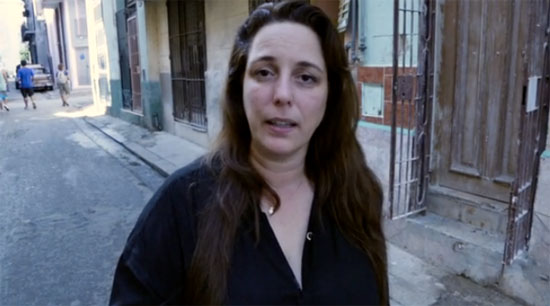Tania Bruguera Commits To Civic Education Of Cubans
By Mario Penton
Translating Cuba - 14ymedio
April 1, 2016

Tania Bruguera in the fundraising video for the Hanna Arendt International Institute of Artivism
When in late 2014 the Cuban artist Tania Bruguera attempted to stage her performance of Tatlin’s Whisper in the Plaza of the Revolution, she felt firsthand the repression and censorship to which all voices who dissent from the government’s cultural guidelines are subjected.
Bruguera, who defines herself as an artivist, has created the Hannah Arendt International Institute of Artivism (INSTAR), with a site in Havana that, in the words of its founder, “will be a civic and artistic alternative to the emphasis in Cuba right now on economic projects, and with money as the unique salvation to the problems of the country.”
[Click here to play video]
The objective of the new campaign is the civic literacy of the citizenry. This is a project that seeks “to work with Cubans, from housewives and professionals to activists and students, so that they can participate in or initiate change in their own communities.” Her inspiration has been the thinking of the German philosopher Hannah Arendt, author of the classic The Origins of Totalitarianism.
“We are at a moment when the Cuban government is not concerned about preserving the ethic principles and social justice that we seek to defend because there is no national project,” commented the artivist to 14ymedio.
In her opinion, the Cuban government is currently engaged in consolidating their personal economic power, with which they will also guarantee their permanence in political power. Cuba is caught between a civic and an ideological crisis because there is no long-term strategic vision for the country.
According to Bruguera her motivations for creating this campaign are based on the observation of Cuban reality. “We are accepting as normal corruption on the part of institutions and the citizenry. There is a calculated government effort to ensure that citizens do not feel empowered, because they are afraid,” she says.
The institute seeks to place Cuba’s future in the hands of Cubans, affirming that asking for their rights cannot wait until everything is decided and irreversible. “The time to intervene in Cuba’s future is now.”
The use of crowdfunding as a financing mechanism is an important element of the campaign with regards to money, which “is a very sensitive topic for Cuban projects.” This method, according to Bruguera, is democratic, because it forces the project to serve the citizenry and is a real commitment if one truly desires change. In addition, the artist added, INSTAR will be transparent with its accounting, showing where its financing comes from and where it goes, something it is hoped will spread to other civil society groups and to the government “as a part of their own working strategies.”
With seven days to go in the campaign, it has already exceeded its goal of $100,000 from almost 700 donations. The money will be used to purchase the equipment needed to carry out the project in Cuba, as well as to pay artists and fund the necessary logistics.
The citizen education workshops will be developed based on the demands of the participants, who the organization hopes will come from the entire political, social and cultural spectrum of the nation, under “the principles of transparency, respect and equality that govern INSTAR.”
The artivist summarizes the strategy of the institute in three actions: “Longing, Thinking and Acting. We want to convert ideas into civic action.” The desires and complaints of the participants will lead to the discussion of existing alternatives, presented by national and foreign guests, and the most realistic way of implementing them. Finally they will be put into action, “mobilizing and visualizing them with the creativity of the activists and artivists.”
Cuban State Security has begun pressuring those linked to the project. The permits to finished preparing the site that will house the institute took eight months to acquire, and the project manager charged with completing the construction asked them not to call him any more because State Security had “been to see” him. “We know we will be under a great deal of pressure because this project signifies a peaceful solution and achieving a civic education,” comments Bruguera.
Despite government barriers, Bruguera isn’t considering wavering in her intent. “Art committed to social activism is the path we have chosen for INSTAR as a relevant institution in the conquest of Cubans’ civil rights and for its direct impact on everyday life,” she concludes.
____________________________ | 